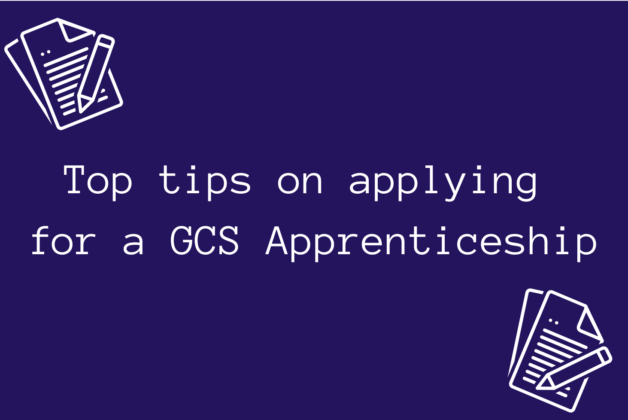Top tips on applying for a GCS Apprenticeship

I am currently a Government Communication Service (GCS) apprentice, working towards my Level 4 Public Relations and Communications Apprenticeship Standard. This apprenticeship is ideal for someone who has completed their A-levels (which was my route!), a degree, or even as a career change later down the line.
You may have read some of the blogs from other apprentices in my cohort, explaining what a day in the life of an apprentice is like, these give you a great insight into what government apprentices get up to.
In this blog, I’m going to give you my top tips on the application process – which has five different stages – so you can get the best out of your application.
Stage 1: Submitting your CV
First, you will be asked to fill out an application form. This includes submitting your CV and writing a personal statement.
At this stage the recruiters will read your application and see if you are eligible, and if you would be a good candidate (on paper) for the role. So, make sure you read the specific instructions and requirements included in the advert, many will have word counts that you must stick to.
Your CV will be sifted and scored, so my top tips for this first stage are:
- Keep your CV brief but detailed
- Double check your spelling and grammar
- Be clear in your achievements
- Always use ‘I’ instead of ‘We’
- Use defined headings throughout to make it easier to read
- Start with your current role going backwards, trying to add in brief job descriptions for each role, and your main responsibilities.
Finally, remember to keep your CV free of personal details. Applications on Civil Service Jobs are kept anonymous until after the sifting stage to give everyone a fair chance.
Stage 2: Writing your personal statement
The second stage of the application process is to write a personal statement. Personal statements are a way for you to sell yourself to your prospective employer – What makes you a good fit?
So, remember to:
- Write in your own personal style (although still keep it quite formal)
- Add in any achievements that may relate to the role and a few brief sentences about how those achievements have helped develop your character
- Keep your evidence here concise, by following the STAR (Situation, Task, Action, Results) format.
Stage 3: Interview
If you get through the sift, you will be invited to an interview. This is usually carried out online with an interview panel (especially for apprentice applicants). It can be quite daunting, but, don’t worry, these top tips can help you prepare for your interview.
Prepare some examples of your skills and behaviours using the STAR format. This will help give your examples some structure when you’re in the interview.
Look up the employer and check them out on social media:
- What are they working on currently?
- What would you like to work on that they have done in the past?
It is also a good idea to come up with some questions to ask at the end of your interview, such as:
- How long have you been with the company?
- What did you do before this?
- Why did you join this company?
Asking these questions helps you connect with your interviewer, and also shows that you have an interest in them as an employer, and want to know more about the job you are applying for.
It’s also a good idea to prepare and practise some example questions and answers before the interview. This can give you extra confidence and keep you calmer when in a high pressure situation.
Whilst in the interview, be calm and confident. You obviously have the qualifications needed to do the job because you were successful at the sifting stage, you now just need to sell yourself.
You should also try to maintain eye contact and think through your answers instead of jumping straight into it. Interviewers would much rather see you take a few seconds to consider your response and give a more thought through answer, than talk straight away and not make much sense.
Stage 4 and 5: Security checks and job offers
Following your interview there isn’t much else to do but wait for the outcome!
If you have passed the interview stage, you will receive a provisional offer. This is conditional based on you passing the security checks needed to complete your role.
For security checks, you must provide three different forms of identification.These could be your passport, driving/provisional licence, birth certificate or a bank statement with your name and address on it.
Finally, once you have passed all the security checks, you will receive your official employment offer. This will come with your contract of employment, and then you will officially be employed by the Civil Service.
If you aren’t successful, please don’t be disheartened. Make sure you ask for feedback and use the experience to help you prepare for future applications and interviews.
More information
I’ve gathered some other helpful resources for further reading – from CV prep to acing your interview!
